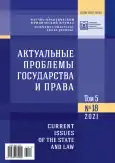DIGITALIZATION OF LEGAL EDUCATION: THEORETICAL ASPECT
- Authors: Maksimova I.M.1
-
Affiliations:
- Derzhavin Tambov State University
- Issue: Vol 5, No 18 (2021)
- Pages: 244-252
- Section: General Theory and History of Law and the State
- URL: https://journal-vniispk.ru/2587-9340/article/view/303989
- ID: 303989
Cite item
Abstract
We consider current issues of introducing digital technologies into the education system, including in the lawyers’ preparation. We state that digital technologies in a rapidly changing world are not only a tool, but also a kind of life environment that opens up completely new opportunities and makes legal education accessible: the use of individual educational routes, training at any time and from any place where there is the Internet, continuous education. We establish that digitalization is the increasing introduction of digital resources into all spheres of society and is a global trend that is developing rapidly and cannot be stopped. We propose arguments that the development of digital technologies in the field of legal education is highly actualized and supported at the state level. We substantiate that in the process of digitalization, the structure of education is significantly changing, as well as the approach to the organization of the educational process and the educational environment of students. We argue that the use of new technologies in the educational process is one of the main conditions for the further development of digital education. We identify the strengths and weaknesses of the digitalization of legal education.
About the authors
Irina M. Maksimova
Derzhavin Tambov State University
Author for correspondence.
Email: irma_tmb@mail.ru
ORCID iD: 0000-0002-2755-0024
Candidate of Law, Deputy Director for Academic Affairs of Law and National Security Institute
Russian Federation, 33 Internatsionalnaya St., Tambov 392000, Russian FederationReferences
- Aksyukhin A.A., Vitsen A.A., Meksheneva Z.V. Informatsionnyye tekhnologii v obrazovanii i nauke [Information technologies in education and science]. Sovremennyye naukoyemkiye tekhnologii – Modern high technologies, 2009, no. 11, pp. 50-52. (In Russian).
- Khalin V.G., Chernova G.V. Tsifrovizatsiya i eye vliyaniye na rossiyskuyu ekonomiku i obshchestvo: preimushchestva, vyzovy, ugrozy i riski [Digitalization and its impact on the Russian economy and society: advantages, challenges, threats and risks]. Upravlencheskoye konsul’tirovaniye – Administrative Consulting, 2018, no. 10, pp. 44-48. (In Russian).
- Klimchuk A.A. Sovremennyye tendentsii ispol’zovaniya informatsionnykh tekhnologiy v obrazovanii [Modern Trends in the Use of Information Technology in Education]. Krasnoyarsk, 2019, 24 p. (In Russian).
- Moskaleva O. Opasnosti, kotoryye tait tsifrovizatsiya [The dangers of digitalization]. Zhilishchnoye pravo [Housing Law], 2017, no. 10, pp. 23-26. (In Russian).
- Vagramenko Y.A., Rusakov A.A. Pedagogicheskiye aspekty vliyaniya IKT na kharakter sovremennogo obrazovaniya [Pedagogical aspects of the influence of ICT on the nature of modern education]. Obrazovatel’nyye tekhnologii i obshchestvo – Educational Technology & Society, 2017, vol. 20, 433 p. (In Russian).
- Romanovskaya V.B., Salnikov V.P. O perspektivakh razvitiya vysshego obrazovaniya v Rossii: novyye tendentsii [On the prospects for the development of higher education in Russia: new trends]. Yuridicheskaya nauka: istoriya i sovremennost’ – Juridical Science: History and Modernity, 2018, no. 10, pp. 11-16. (In Russian).
- Lyakh Y.A. Model’ organizatsii personalizirovannogo obucheniya shkol’nikov [The model of personalized learning organization in modern school]. Yaroslavskiy pedagogicheskiy vestnik – Yaroslavl Pedagogical Bulletin, 2019, no. 3 (108), pp. 17-21. (In Russian).
Supplementary files








